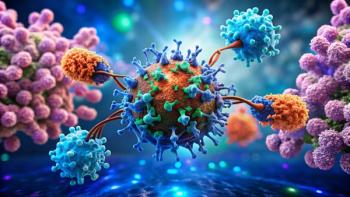
Signals of Change: How Biomarkers Are Reshaping Oncology and Healthcare Delivery
Biomarkers are pivotal for confirming diagnoses, predicting disease progression, and tailoring therapeutic modalities. Recent research focuses on the ‘omics’ technologies —genomics, proteomics, metabolomics.
Cancer remains a leading cause of global mortality, requiring advancement in diagnostic and therapeutic strategies. In modern oncology, cancer biomarkers — biological molecules such as proteins, genes, or metabolites that indicate the presence, progression, or behavior of cancer — have become crucial to diagnosis and treatment. This field is rapidly evolving, driven by cutting-edge platform technologies and innovative ‘multi-omics’ approaches. An editorial published in September 2025 in
M. Walid Qoronfleh, Ph.D., MBA, of the Q3 Research Institute in Ypsilanti, Michigan, and Nader Al-Dewik, Ph.D., of Hamad Medical Corporation in Doha, Qatar, pointed out that the importance of biomarkers lies in their ability to offer actionable insights into cancer’s complex and heterogeneous nature of oncology biomarkers. Some biomarkers are quite familiar; the PSA test for prostate cancer and CA-125 for ovarian cancer have been widely utilized. But they have limitations in sensitivity and specificity, potentially resulting in overdiagnosis or overtreatment, note Qoronfleh and Al-Dewik.
Recent research focuses on overcoming these limitations through advanced ‘omics’ technologies (genomics, proteomics, metabolomics). Key innovations include the development of noninvasive liquid biopsies, which analyze circulating tumor DNA (ctDNA) or circulating tumor cells from a blood sample, permitting early detection and real-time monitoring of cancers. Multianalyte blood tests have shown promise in detecting multiple cancer types simultaneously.
In diagnosis and treatment, biomarkers are pivotal for confirming diagnoses, predicting disease progression, and tailoring therapeutic modalities. The transition to employing extensive biomarker panels or profiling, often by next-generation sequencing, is increasingly prevalent. Predictive biomarkers ensure targeted therapies are deployed effectively, and some have been used for many years. HER2 status guides breast treatment choices and EGFR mutations, some of the branches of the lung cancer treatment decision tree, Qoronfleh and Al-Dewik explain. Furthermore, monitoring treatment responses through serial ctDNA measurements helps track tumor burden and identify resistance mechanisms, guiding timely switches to alternative agents.
The future of oncology is transitioning to dynamic, data-driven treatment options, according to Qoronfleh and Al-Dewik. A fundamental aspect of this advice is the amalgamation of multi-omics data, incorporating genomic, proteomic, and metabolomic profiles, with artificial intelligence (AI) and machine learning analysis. Artificial intelligence is expediting biomarker development and validation through the analysis of intricate datasets, uncovering concealed patterns, and improving predictive precision. These computational methods are anticipated to predict therapeutic responses, identify minor resistance patterns, and propose innovative drug combinations. Artificial intelligence is currently expediting the identification of novel cancer therapeutics advancing to clinical trials.
The future of public health may depend on multi-cancer early detection tests, such as the Galleri screening test, which aims to detect more than 50 cancer forms from a single sample. Should these tests prove successful, they could significantly transform oncology towards proactive care, especially for malignancies that currently lack efficient early screening techniques, say Qoronfleh and Al-Dewik.
The widespread implementation of advanced cancer biomarkers has substantial implications for managed healthcare, primarily focused on improving value and optimizing resources. Early cancer screening and detection are inherently cost-effective, as they lower overall morbidity and mortality and deliver practical, worthwhile healthcare services.
Highly personalized therapy plans minimize the use of ineffective or toxic treatments and associated side effects, leading to an equally important reduction in healthcare costs. Precision oncology is central to the healthcare agenda because it optimizes resource use by preserving capacity while deploying advanced technologies.
Companion diagnostics are evolving in sophistication, mitigating avoidable patient suffering, drug toxicity, and healthcare expenditures. This integration with multiplex platforms reinforces the tenets of value-based oncology.
Plenty of obstacles stand in the way, though, and Qoronfleh and Al-Dewik discuss them. Novel tests often struggle to secure reimbursement because they lack long-term outcome data. Moreover, technical obstacles such as limited sensitivity, platform variability, and the intrinsic biological heterogeneity of tumors require extensive validation and standardization across varied populations to guarantee reliability and consistency in conventional healthcare environments. Continuous investment and cooperation are necessary to enhance access to biomarker testing and fully exploit the advantages of these novel pharmaceuticals and precision-targeted treatment strategies.
Newsletter
Get the latest industry news, event updates, and more from Managed healthcare Executive.

























